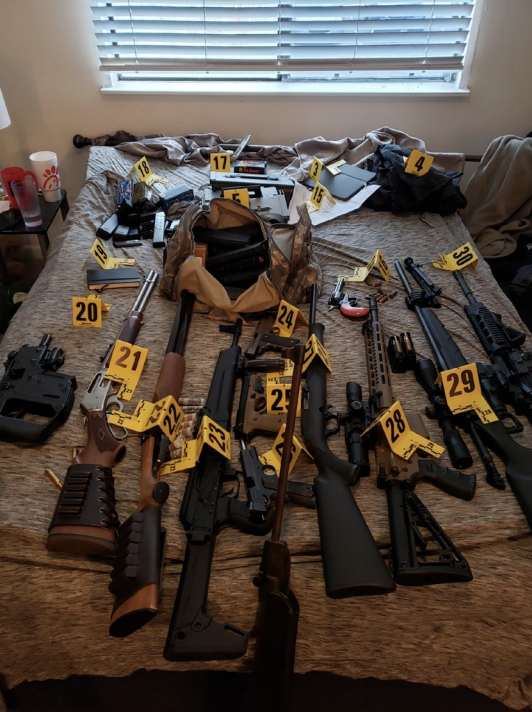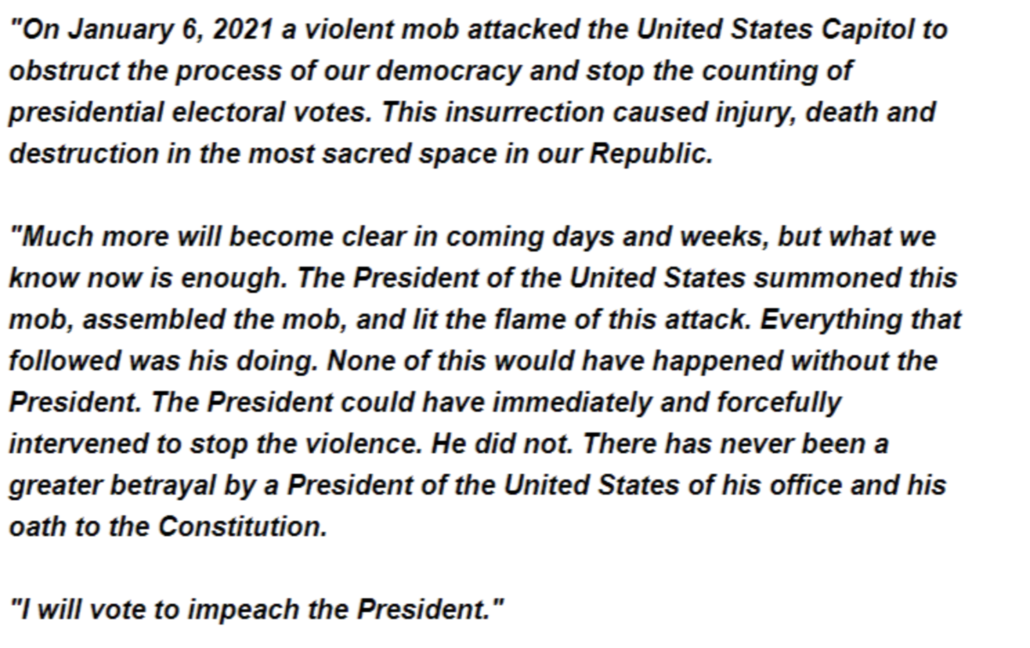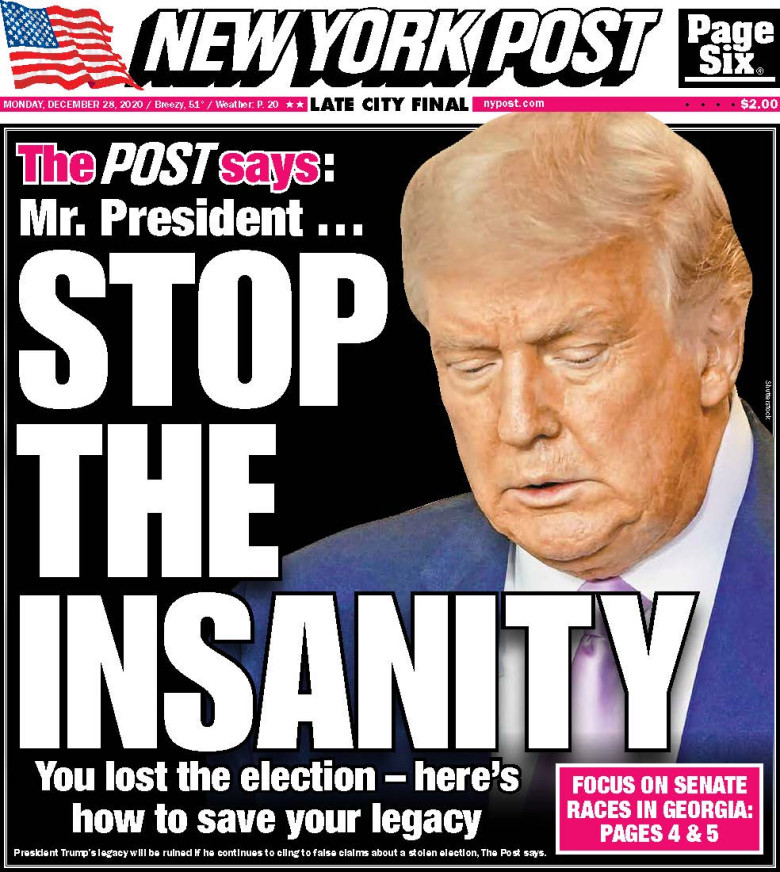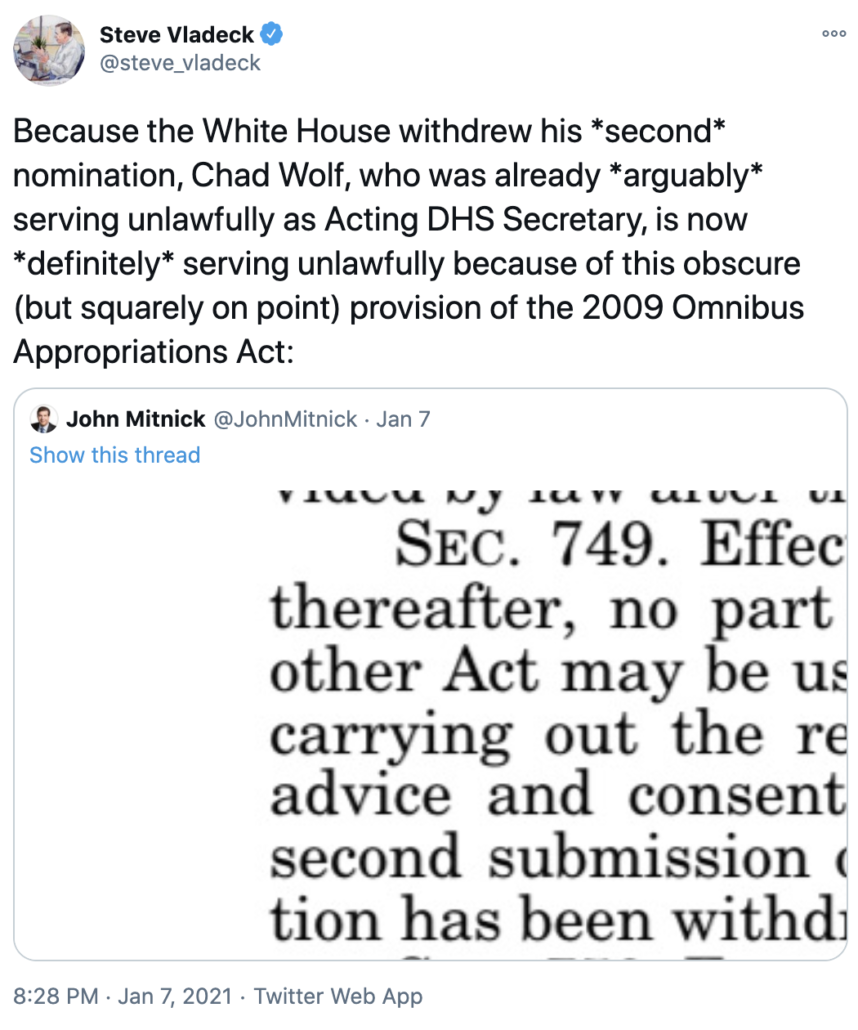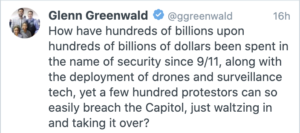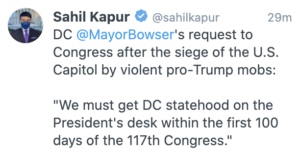A Tale of Two Zip-Tie Guys: Criminal Protestor or Armed Insurrectionist?
There was a fair amount of disbelief last week when Eric Munchel, better known as Zip-Tie Guy, was given bail by a magistrate judge in Tennessee. But as I noted, the evidence as presented to Judge Chip Frensley did not allege preplanning and did not show Munchel engaged in violence. As laid out in the detention memo, Munchel owns an arsenal of guns, but they are all legal. As such, Frensley’s decision was probably correct.
As I noted in an update to that post, however, the evidence prosecutors presented to obtain the emergency stay of Munchel’s release did include an act of violence, targeted at Bloomberg reporter William Turton, who filmed Munchel in the Grand Hyatt after the riot.
On the evening of January 6, 2021, after the insurrection, an individual posted a video of the Grand Hyatt hotel lobby on Twitter. The person then posted a message that read: “After I took this video, several Trump supporters harassed me and tried to follow me to my room. One accused me of being ‘antifa.’3 Hotel security intervened and moved me to new room. What a weird day.” See https://twitter.com/WilliamTurton/status/1346980284252745729 (Last accessed on January 23, 2021). The person added: “The Trump supporters demanded that I delete the video. One woman flashed her taser at me, and threatened to mace me.” See https://twitter.com/WilliamTurton/status/1347024856416714752 (last viewed January 23, 2021). Two days later, on January 8, based on another video from the Grand Hyatt posted to social media, the person identified the defendant as “one of the people in the hotel lobby who demanded I delete the video, put his hands on me, and screamed at me . . . .” See https://twitter.com/WilliamTurton/status/1347699125408641024 (last viewed January 23, 2021); https://twitter.com/WilliamTurton/status/1347699345345417217 (last viewed January 23, 2021). Evidence of this encounter was not presented at the preliminary and detention hearing in the Middle District of Tennessee.
There’s a more important difference between the detention motion submitted in Tennessee and the one submitted in DC, beyond the fact that one was presented in a conservative state and the other was presented to a Democratically appointed judge in the city targeted in the insurrection.
The initial detention motion describes Munchel’s actions as those of a protestor who committed crimes in the process of protesting, while threatening violence.
The United States of America, by and through its attorney, the United States Attorney for the Middle District of Tennessee, respectfully files this memorandum in support of pre-trial detention. The defendant, Eric MUNCHEL, traveled to Washington, D.C. to attend the “Stop the Steal” rally on or about January 6, 2021, where he intended to protest the outcome of the 2020 Presidential election. MUNCHEL was prepared for conflict: as he told a reporter, he was ready to “rise up” and “fight if necessary.” After the rally concluded, MUNCHEL—who was dressed in tactical gear and carried a taser on his hip, and stashed other “weapons” in a tactical bag outside the Capitol—unlawfully entered the U.S. Capitol along with a mob of rioters who smashed windows and broke through doors. MUNCHEL gleefully acquired several sets of plastic handcuffs as he walked through the Capitol and entered the Senate chamber, where only moments earlier the Vice President of the United States was certifying the results of the 2020 Presidential election. In the Senate gallery, MUNCHEL stood with a crowd whose members shouted “Treason!” and lamented the disappearance of lawmakers from the chamber moments earlier. MUNCHEL’s conduct here was dangerous and extremely serious. This Court should adopt the recommendation of the Pretrial Services Office and detain MUNCHEL pending trial. [my emphasis]
The first paragraphs of the emergency motion, by contrast, describe him as one of a concerted pack of insurgents who successfully used terror to halt constitutionally mandated proceedings.
Armed with a taser and clad for battle in fatigues, a tactical vest, combat boots, gloves, and a gaiter that revealed only his eyes, the defendant, Eric Munchel, stormed the United States Capitol on January 6, 2021. Upon penetrating the building through a door breached by insurgents, the defendant grabbed a handful of Capitol Police flexicuffs and exclaimed: “Zip ties. I need to get me some of them mother—-s!” Then, with his co-conspirator, Lisa Eisenhart—who also wore a tactical vest and took flexicuffs—the defendant joined a group of insurgents searching for Members of Congress. Surrounded by insurgents exhorting veiled threats such as “Treason!”, “Anybody home?”, “They’re cowards!”, and “Are you afraid?”, the defendant infiltrated the Senate chamber—only minutes after the Senate body, including the Vice President of the United States, had been evacuated. The invasion halted the proceedings of a Joint Session of Congress, which had convened to certify the Electoral College vote as required by the Twelfth Amendment. [my emphasis]
A later paragraph discounts the claim that Munchel intended to do nothing more than protest.
First, the nature and circumstances of the offense involve fear, intimidation, and violence— directed at law enforcement, elected public officials, and the entire country. The defendant can make no serious claim that he went to the Capitol on January 6 intending to engage in peaceful protest or civil disobedience. Instead, the evidence supports the conclusion that he intended to contribute to chaos, obstruct the Electoral College certification, and sow fear. This is illustrated by the defendant’s preparation before reaching the Capitol and expressly stated intent: the defendant dressed in combat attire from head to toe; armed himself with a taser (and, appearing from his own cell phone video and audio recording, a more dangerous weapon); and told a reporter that his intent in going to the Capitol was “a kind of flexing of muscles” and that he was ready to “fight if necessary.” Once at the Capitol, the defendant’s conduct was consistent with that expressly stated intent: the defendant helped and encouraged other insurgents to ascend a wall to access the Capitol; exclaimed that he was “F—ing ready to f–k s–t up”; affirmed cries of “Treason” by other insurgents; responded to the chaos by exclaiming, “I guess they thought we were playing!”; stormed into the Capitol through a breached door; grabbed Capitol Police plastic flexicuffs, comprehending that they are instruments of restraint and kidnapping; marched throughout the Capitol searching for Members of Congress who he believed had committed “Treason”; and infiltrated the Senate chamber. The nature and circumstances of the alleged offenses all indicate forethought and specific intent to obstruct a congressional proceeding through fear, intimidation, and, if necessary, violence. These threads—planning, forethought, intent—are all indicative of a capacity and willingness to repeat the offense and pose a clear threat to community safety. As the defendant himself told The Times reporter, “[t]he point of getting inside the building [was] to show them that we can, and we will” (emphasis added).
As with her son, the government told two different stories about the actions of Munchel’s mother, Lisa Eisenhart, who like him was first granted bail then detained on an emergency motion.
The introductory paragraph of her TN detention motion mentions her boast that she was willing to die rather than live under oppression. But even where it reviews her language in more depth later in the filing, it portrays as it as mere, “disillusionment with the outcome of the 2020 Presidential election,” not a willingness to overthrow the Constitutional order because of it.
The defendant, Lisa EISENHART, traveled to Washington, D.C. to attend the “Stop the Steal” rally on or about January 6, 2021, where she intended to protest the outcome of the 2020 Presidential election. EISENHART was prepared for conflict: as she told a reporter, she would rather “die” and “fight” than “live under oppression.”
[snip]
EISENHART also made statements evincing an intent to engage in violent conduct, and even sacrificing her own life, because of her disillusionment with the outcome of the 2020 Presidential election. [my emphasis]
And as the emergency motion for her son described his own act of violence, Eisenhart’s emergency detention motion describes her approval of the violence around her. (Munchel’s federal defender got prosecutors to admit at his bail hearing that his mom voiced more overt support for violence than he espoused; he even pointedly called out, “Don’t break shit,” … “No vandalizing shit”.)
Down the road, prosecutors will describe these statements from her as one after another agreement with others to engage in violent insurrection.
The nature and circumstances of the offense involve fear, intimidation, and violence— directed at law enforcement, elected public officials, and the entire country. The defendant can make no serious claim that she went to the Capitol on January 6 intending to engage in peaceful protest or civil disobedience. Instead, the evidence supports the conclusion that she intended to contribute to chaos, obstruct the Electoral College certification, and sow fear. Specifically, Eisenhart, dressed for combat in a tactical or bulletproof vest, stormed the Capitol building with other insurgents and:
- carried dangerous “weapons” onto Capitol grounds and stashed them before storming the Capitol building, because “We’re going straight to federal prison if we go in there with weapons”;
- encouraged insurgents to climb a Capitol wall and storm inside, exhorting: “Yeah, go up in there. You can go up in there now”;
- encouraged Munchel to go inside the Capitol despite knowing that Capitol Police were trying to keep insurgents out—including by using tear gas (“we’re going in”; “the [tear] gas isn’t bad”);
- cheered on another insurgent who she understood to have “punched two of them in the face”—likely a reference to Capitol Police;
- celebrated as her “best day” an assertion by another insurgent that Members of Congress had been tear gassed (“That is [unintelligible] my best day, to know they got tear gassed.”);
- grabbed Capitol Police flexicuffs from inside the Capitol and searched for Members of Congress alongside other insurgents, together shouting threatening chants of: “Anybody home?”; “They went into the tunnels”; “Where’d you go?”; “They’re cowards!”; “Are you afraid?”; and “Treason!”; and
- cognizant of the severity of her and Munchel’s crimes, advised before leaving the Capitol: “Don’t carry the zip ties, just get ‘em out of their hand, out of [unintelligible] get ‘em out of our hands.”
The offense circumstances illustrate a profound disrespect for the rule of law and law enforcement, indicating that the defendant’s unwillingness and incapacity to respect court-imposed conditions and demonstrating that no release condition will reasonably assure the community’s safety.
Both emergency motions for detention include a paragraph describing the danger mother and son pose as an unprecedented threat to democracy.
Finally, as we asserted in the Munchel appeal, it is difficult to fathom a more serious danger to the community—to the District of Columbia, to the country, or to the fabric of American Democracy—than the one posed by armed insurrectionists, including the defendant and Munchel, who joined in the occupation of the United States Capitol. Every person who was present without authority in the Capitol on January 6 contributed to the chaos of that day and the danger posed to law enforcement, the Vice President, Members of Congress, and the peaceful transfer of power. The defendant’s specific conduct aggravated the chaos and danger. It was designed to intimidate Members of Congress and instigate fear across the country. The defendant’s active participation in a violent insurgency on the Capitol designed to undermine the democratic process poses a serious and ongoing danger to the community that no release condition can reasonably assuage. As co-conspirator Munchel told The Times reporter: “[t]he point of getting inside the building [was] to show them that we can, and we will” (emphasis added); and as the defendant maintained, she would rather “die” and “fight” than “live under oppression.” Only detention mitigates the grave danger the defendant and Munchel pose. [my emphasis]
I expect readers of this site will agree with the latter emergency motions, and I definitely agree about the threat the insurrection posed to democracy.
But it is critical to understand that legally, both motions are true.
The difference lies in the additional overt act including in Munchel’s emergency motion and the import ascribed to Eisenhart’s statements in hers. More importantly, the difference lies in the effect of their actions — and the actions of others that, videos show, they encouraged: to halt a constitutionally mandated act using terror.
Defense attorneys will argue, the threats to Turton notwithstanding, that there is no definitive evidence that Munchel or Eisenhart intended to engage in violence at the Capitol (and in Munchel’s case, they’ll cite his own statements warning against destruction). Outside the context of a concerted plan to prevent the certification of the election, one can make a compelling case that Munchel and Eisenhart are nothing more than protestors who broke the law.
It’s possible that prosecutors in Tennessee didn’t include that because they view the election outcome differently or simply view these two as individual defendants outside the context of the larger goal. It’s possible they’re simply not privy to much of the evidence that gives prosecutors in DC confidence they’ll be able to prove a more concerted effort, a concerted effort that Munchel and Eisenhart both willingly took a part in. It’s likely that DC prosecutors aren’t including other prosecutors in plans to build the sedition charge mentioned in the emergency motions.
The evidence amassed so far subjects the defendant to felonies beyond that with which he has been charged so far, including obstructing Congress, interstate travel in furtherance of rioting activity, sedition, and other offenses.
But the successful prosecution of Zip-Tie Guy and his mom will depend on prosecutors’ success at making that larger case and showing that both of them agreed to the larger goal.
I’ve alluded to, several times, how the case against the Hutaree Militia foundered based on two things: prosecutors’ reliance on speech as proof that each member of the conspiracy entered into a goal of attacking the US government, and insufficient proof that the federal government itself was the target.
The lesson is important background for the January 6 insurrection. In her opinion throwing out most of that prosecution, Judge Victoria Roberts emphasized the meticulous scrutiny that a charge of seditious conspiracy must give to speech acts.
Where a conspiracy implicates First Amendment protections such as freedom of association and freedom of speech, the court must make a “specially meticulous inquiry” into the government’s evidence so there is not “an unfair imputation of the intent or acts of some participants to all others.” United States v. Dellinger, 472 F.2d 340, 392 (7th Cir. 1972). It is black-letter law that “[a] defendant cannot be convicted of conspiracy merely on the grounds of guilt by association, and mere association with the members of the conspiracy without the intention and agreement to accomplish an illegal objective is not sufficient to make an individual a conspirator.” Lee, 991 F.2d at 348. Likewise, mere presence at the scene does not establish participation in a conspiracy. United States v. Paige, 470 F.3d 603, 609 (6th Cir. 2006).
The Government has consistently maintained that this case is not about freedom of speech or association, but about the specific acts of violence alleged in the Indictment. The Court relied upon these representations in denying Defendants’ pretrial motions for a jury instruction on the Brandenburg case, and the heightened strictissimi juris standard for sufficiency of the evidence (Docs. 610, 618). However, much of the Government’s evidence against Defendants at trial was in the form of speeches, primarily by Stone, Sr., who frequently made statements describing law enforcement as the enemy, discussing the killing of police officers, and the need to go to war. Indeed, at oral argument on March 26, 2012, the Government asked the Court to find the existence of a seditious conspiracy based primarily on two conversations involving Stone, Sr., and others — the first on August 13, 2009, and the second on February 20, 2010.
And she cited precedent that requires that seditious conspiracy must target the US government itself (the Hutaree allegedly hoped to spark a larger rebellion by killing some cops — not far different from what the Boogaloo espouse).
In Anderson v. United States, the Eighth Circuit applied Baldwin and dismissed a seditious conspiracy charge where the force sought to be exerted was “not against those whose duty it should be to execute the laws.” 273 F. 20, 26 (8th Cir. 1921). Defendants were charged with seditious conspiracy for conspiring to prevent, hinder and delay by force, various laws of the United States, including the congressional declaration of war with Germany, and laws relating to conscription. Id. at 22-23. In furtherance of the seditious conspiracy, the Indictment alleged that the defendants circulated books and periodicals calling for strikes and the overthrow of the capitalist system and criticizing the war and individuals who joined the armed services. Id. at 24- 24.
Relying on Baldwin, the Court stated that for the Indictment to sufficiently charge seditious conspiracy, the purpose of the conspiracy must be “the exertion of force against those charged with the duty of executing the laws of the United States . . . .” Id. at 26. The court then held that the Indictment was insufficient because the “force was to be exerted, not against those whose duty it should be to execute the laws, and while attempting to do so, but its application was to be made against industrial and commercial activities by lawless acts during strikes for the purpose of accomplishing alleged socialistic ends . . . .” Id.
The law is clear that seditious conspiracy requires an agreement to oppose by force the authority of the United States itself. It must be an offense against the Nation, not local units of government. See Commonwealth of Pennsylvania v. Nelson, 350 U.S. 497, 505 (1956) (“Sedition against the United States is not a local offense. It is a crime against the Nation.” (citation and quotation marks omitted)). Any overt act in furtherance of seditious conspiracy must further a common plan to oppose the United States by force; otherwise, “the seditious conspiracy statute would expand infinitely to embrace the entire agenda of anyone who violated it . . . .” United States v. Rahman, 854 F. Supp. 254, 260 (S.D.N.Y. 1994); see also Haywood v. United States, 268 F. 795, 800 (7th Cir. 1920) (“[The seditious conspiracy statute] should not be enlarged by construction.”).
In that case, Roberts found that a plan to murder cops did not amount to seditious conspiracy.
The discussions of seditious conspiracy in Baldwin and Anderson are important to this case; while the Government presented evidence of vile and often hateful speech, and may have even shown that certain Defendants conspired to commit some crime – perhaps to murder local law enforcement — offensive speech and a conspiracy to do something other than forcibly resist a positive show of authority by the Federal Government is not enough to sustain a charge of seditious conspiracy. A conspiracy to murder law enforcement is a far cry from a conspiracy to forcibly oppose the authority of the Government of the United States.
The attack on the Capitol is an entirely different matter from that attempt by right wing militia members to spark an uprising in 2010. The targets of the January 6 conspiracy included the first and second in line to the Presidency, Mike Pence and Nancy Pelosi. Among the cops who were targeted — including the one who was murdered — were Capitol Police. The act that rioters were impeding was the execution of a duty laid out in the Constitution, certifying the Presidential election.
There’s little question that this amounts to a conspiracy against the government of the United States.
Nevertheless, as prosecutors tell one after another story about the individuals involved, they are going to have to make it clear, in each case, how each individual’s actions and stated goals tie to that larger effort to overthrow the constitutional working of the US government.
Update: Corrected where in succession Pence and Pelosi were.

